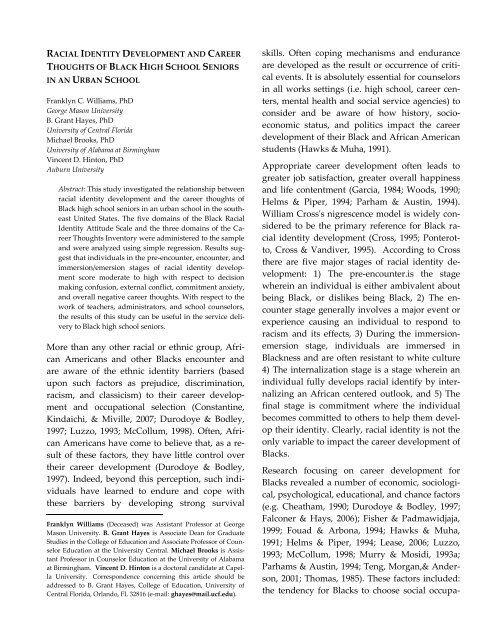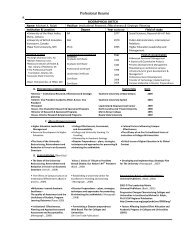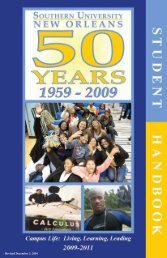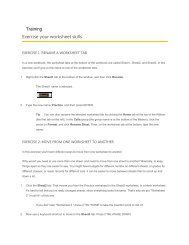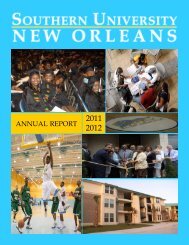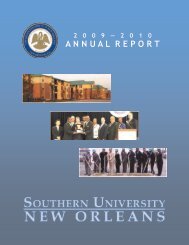Journal of - Southern University New Orleans
Journal of - Southern University New Orleans
Journal of - Southern University New Orleans
- No tags were found...
You also want an ePaper? Increase the reach of your titles
YUMPU automatically turns print PDFs into web optimized ePapers that Google loves.
RACIAL IDENTITY DEVELOPMENT AND CAREERTHOUGHTS OF BLACK HIGH SCHOOL SENIORSIN AN URBAN SCHOOLFranklyn C. Williams, PhD 16George Mason <strong>University</strong>B. Grant Hayes, PhD<strong>University</strong> <strong>of</strong> Central FloridaMichael Brooks, PhD<strong>University</strong> <strong>of</strong> Alabama at BirminghamVincent D. Hinton, PhDAuburn <strong>University</strong>Abstract: This study investigated the relationship betweenracial identity development and the career thoughts <strong>of</strong>Black high school seniors in an urban school in the southeastUnited States. The five domains <strong>of</strong> the Black RacialIdentity Attitude Scale and the three domains <strong>of</strong> the CareerThoughts Inventory were administered to the sampleand were analyzed using simple regression. Results suggestthat individuals in the pre-encounter, encounter, andimmersion/emersion stages <strong>of</strong> racial identity developmentscore moderate to high with respect to decisionmaking confusion, external conflict, commitment anxiety,and overall negative career thoughts. With respect to thework <strong>of</strong> teachers, administrators, and school counselors,the results <strong>of</strong> this study can be useful in the service deliveryto Black high school seniors.More than any other racial or ethnic group, AfricanAmericans and other Blacks encounter andare aware <strong>of</strong> the ethnic identity barriers (basedupon such factors as prejudice, discrimination,racism, and classicism) to their career developmentand occupational selection (Constantine,Kindaichi, & Miville, 2007; Durodoye & Bodley,1997; Luzzo, 1993; McCollum, 1998). Often, AfricanAmericans have come to believe that, as a result<strong>of</strong> these factors, they have little control overtheir career development (Durodoye & Bodley,1997). Indeed, beyond this perception, such individualshave learned to endure and cope withthese barriers by developing strong survivalFranklyn Williams (Deceased) was Assistant Pr<strong>of</strong>essor at GeorgeMason <strong>University</strong>. B. Grant Hayes is Associate Dean for GraduateStudies in the College <strong>of</strong> Education and Associate Pr<strong>of</strong>essor <strong>of</strong> CounselorEducation at the <strong>University</strong> Central. Michael Brooks is AssistantPr<strong>of</strong>essor in Counselor Education at the <strong>University</strong> <strong>of</strong> Alabamaat Birmingham. Vincent D. Hinton is a doctoral candidate at Capella<strong>University</strong>. Correspondence concerning this article should beaddressed to B. Grant Hayes, College <strong>of</strong> Education, <strong>University</strong> <strong>of</strong>Central Florida, Orlando, FL 32816 (e-mail: ghayes@mail.ucf.edu).skills. Often coping mechanisms and enduranceare developed as the result or occurrence <strong>of</strong> criticalevents. It is absolutely essential for counselorsin all works settings (i.e. high school, career centers,mental health and social service agencies) toconsider and be aware <strong>of</strong> how history, socioeconomicstatus, and politics impact the careerdevelopment <strong>of</strong> their Black and African Americanstudents (Hawks & Muha, 1991).Appropriate career development <strong>of</strong>ten leads togreater job satisfaction, greater overall happinessand life contentment (Garcia, 1984; Woods, 1990;Helms & Piper, 1994; Parham & Austin, 1994).William Cross's nigrescence model is widely consideredto be the primary reference for Black racialidentity development (Cross, 1995; Ponterotto,Cross & Vandiver, 1995). According to Crossthere are five major stages <strong>of</strong> racial identity development:1) The pre-encounter.is the stagewherein an individual is either ambivalent aboutbeing Black, or dislikes being Black, 2) The encounterstage generally involves a major event orexperience causing an individual to respond toracism and its effects, 3) During the immersionemersionstage, individuals are immersed inBlackness and are <strong>of</strong>ten resistant to white culture4) The internalization stage is a stage wherein anindividual fully develops racial identify by internalizingan African centered outlook, and 5) Thefinal stage is commitment where the individualbecomes committed to others to help them developtheir identity. Clearly, racial identity is not theonly variable to impact the career development <strong>of</strong>Blacks.Research focusing on career development forBlacks revealed a number <strong>of</strong> economic, sociological,psychological, educational, and chance factors(e.g. Cheatham, 1990; Durodoye & Bodley, 1997;Falconer & Hays, 2006); Fisher & Padmawidjaja,1999; Fouad & Arbona, 1994; Hawks & Muha,1991; Helms & Piper, 1994; Lease, 2006; Luzzo,1993; McCollum, 1998; Murry & Mosidi, 1993a;Parhams & Austin, 1994; Teng, Morgan,& Anderson,2001; Thomas, 1985). These factors included:the tendency for Blacks to choose social occupa-


